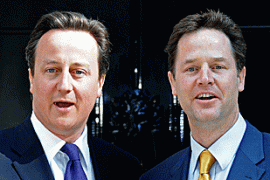British ministers cut their own pay
Cabinet members agree to five per cent wage reduction at first meeting of coalition.

‘Credible programme’
Britain’s first coalition government since 1945 announced on Wednesday that cutting the country’s record budget deficit of $236bn was its “most urgent issue”, detailing plans to slash $9bn from it this year.
The government said cutting ministers’ pay and introducinga five-year salary freeze will save taxpayers $450,000 a year.
“We are all very aware of the seriousness of the situation and frankly if we don’t have a credible programme to reduce the deficit … then we won’t have the confidence of the markets and the confidence of the country,” Jeremy Hunt, the culture secretary, said after Thursday’s meeting.
| special report |
|
Final results |
The government has promised an emergency budget within 50 days.
In an accord released on Wednesday, the coalition also said Britain would not join the eurozone during its five-year parliamentary term, and stressed the need for banking reform to avoid a repeat of the 2008 financial crisis.
William Hague, the foreign secretary, insisted the coalition deal would stand the test of time, saying it would “be a strong government”.
But the British press warned on Thursday that tough decisions that lie ahead could threaten the new partnership.
“The chemistry between Mr Cameron and Mr Clegg … may wear thin as the administration is forced to make hard and unpopular choices,” the Financial Times said.
‘Counter-terrorism’ work
The cabinet meeting comes hours after the government hosted its new national security council.
Ministers were briefed on the situation in Afghanistan and counter-terrorism work in the UK.
Hague will meet Hillary Clinton, the US secretary of state, in Washington on Friday in his first overseas visit in the job.
“I think getting to grips with these Afghanistan and Iranian issues is right at the top of our agenda,” he said.
A visit to Europe would follow “very quickly,” he added.
Meanwhile, the Labour party, now in opposition after 13 years in government following the May 6 election, has begun its search for a new leader.
David Miliband, the former foreign secretary and frontrunner to succeed Gordon Brown, began campaigning around the country on Thursday after declaring himself a candidate Wednesday.
Others are likely to join him in making a bid for the leadership within the coming days.
